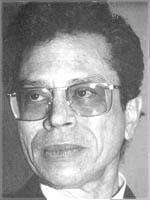Leo Brouwer
Juan Leovigildo Brouwer Mezquida (born March 1, 1939) is a Cuban composer, conductor, and classical guitarist. He is a Member of Honour of the International Music Council.[1]
Leo Brouwer | |
|---|---|
 | |
| Background information | |
| Birth name | Juan Leovigildo Brouwer Mezquida |
| Born | March 1, 1939 Havana, Cuba |
| Genres | Classical, folk, aleatoric, atonal |
| Occupation(s) | Musician, composer, conductor |
| Instruments | Guitar |
| Years active | 1967–present |
| Labels | Egrem, Zoho Music |
Family
He is the grandson of Cuban composer Ernestina Lecuona y Casado.[2] His great-uncle, Ernesto Lecuona, composed "La Malagueña" and his second cousin, Margarita Lecuona, composed "Babalú", which was popularized by Cuban musician and actor Desi Arnaz.[3]
Music career
Early years
Brouwer was born in Havana. When he was 13, he began classical guitar with the encouragement of his father, who was an amateur guitarist. His teacher was Isaac Nicola, who was a student of Emilio Pujol, who was himself a student of Francisco Tárrega. At age 17 he performed publicly for the first time and began composing.[4]
Brouwer went to the United States to study music at the Hartt College of Music of the University of Hartford, and later at the Juilliard School,[4] where he studied under Vincent Persichetti and took composition classes with Stefan Wolpe.
In 1970 Brouwer played in the premiere of El Cimarrón by Hans Werner Henze in Berlin. Together with Morton Feldman, he was awarded a 1972 scholarship by the DAAD (German Academic Exchange Service) and to work as a guest composer and lecturer at the Academy of Science and Arts of Berlin. In Germany Brouwer also recorded a number of LPs for Deutsche Grammophon.[5][6][7][8][9][10][9]
Composing and performing
In his early compositions, Brouwer remained close to the rhythms of Cuban music, while later he was drawn to aleatoric music. During the 1960s and 70s, he became interested in the music of modernist composers such as Luigi Nono and Iannis Xenakis, using indeterminacy in works such as Sonograma I. Other works from this period include the guitar pieces Canticum (1968), La espiral eterna (1971), Parábola (1973) and Tarantos (1974). More recently, Brouwer's works have leaned towards tonality and modality. The solo guitar works El Decamerón Negro (1981), Paisaje cubano con campanas (1986), and the Sonata (1990; for Julian Bream) exemplify this tendency. His playing career ended in the early 1980s due to an injury to a tendon in his right hand middle finger.[11][12]
Brouwer has written for guitar, piano, and percussion, and has composed orchestral works, ballet, and music for over one hundred movies, including the film Like Water for Chocolate.[3] For a guitar competition in Hungary in 1979, he wrote a composition that employed 200 guitarists. He is known for a series of studies called the Etudes Simples.[4] Brouwer has also transcribed Beatles songs for classical guitar.[3]
He has performed and recorded works by Sylvano Bussotti, Hans Werner Henze, Maurice Ohana, Cristóbal Halffter, Leni Alexander, Cornelius Cardew, and Heitor Villa-Lobos.[13]
Other activities
He has been a conductor for many symphony orchestras, including the BBC Concert Orchestra, the Berlin Philharmonic, and the Cordoba Symphony in Spain.[4]
Brouwer is involved in the Concurso y Festival Internacional de Guitarra de la Habana (Havana International Guitar Festival and Competition). He frequently travels to attend guitar festivals throughout the world, and especially to other Latin American countries.[14]
Brouwer is a member of the Communist Party of Cuba, and has held a number of official posts in Cuba, including with the music department of the Cuban Institute of Cinematographic Art and Industry.
Brouwer is the great-uncle of Al Jourgensen of Ministry fame. Brouwer is the brother of Jourgensen's maternal grandfather.[15]
Selected compositions
Chamber and solo instrumental
- 2009 Mitología de las Aguas (Sonata No. 1 for flute and guitar)
Film scores
- 1968: Lucía
- 1992: Like Water for Chocolate (film)
References
- "Members of Honour - International Music Council". Imc-cim.org. 2016-04-06. Retrieved 2020-03-21.
- Sadie, Julie Anne; Samuel, Rhian (1994). The Norton/Grove Dictionary of Women Composers. W.W. Norton. p. 272. ISBN 978-0-393-03487-5.
- Bergeron, Kathleen A. (28 September 2016). "Letter from Havana: Leo Brouwer, the Rolling Stones, and the Cuban Guitar Scene". Classical Guitar. Retrieved 28 November 2016.
- Whitesel, Tod. "Leo Brouwer | Biography & History | AllMusic". AllMusic. Retrieved 28 November 2016.
- "Deutsche Grammophon Gesellschaft - Catalogue - DAVID ALAGNA Le Dernier Jour d'un Condamné Roberto Alagna, Indra Thomas, Jean-Philippe Lafont". Archived from the original on 2008-05-23. Retrieved 2020-03-21.
- "LEO BROUWER Rara - Download - Buy Now". Deutschegrammophon.com. 2002-06-03. Retrieved 2020-03-21.
- "Wayback Machine". Archived from the original on 2008-04-22. Retrieved 2020-03-21.
- "Classical Guitar Alive! Play Lists". Guitaralive.org. Retrieved 2020-03-21.
- Rara Archived 2011-04-24 at the Wayback Machine Recording by Leo Brouwer
- Brouwer, Leo; Hdez, Hernández; Carmona, Nisleidys Flores (2004). Leo Brouwer: gajes del oficio.
- "Ministry's Al Jourgensen: "God Keeps Me Around Because I Amuse Him" | Soundcheck". Wnyc.org. 2014-06-16. Retrieved 2020-03-21.
Other sources
- Andy Daly, Leo Brouwer. Music Web International, accessed June 9, 2011
- Brouwer, Leo; Hdez, Hernández; Carmona, Nisleidys Flores (2004). Leo Brouwer: gajes del oficio.
- Hernández, Isabelle (2000). Leo Brouwer. Havana: Editora Musical de Cuba. ISBN 959-7153-01-7.
Further reading
Articles
- Hablar con Leo (in Spanish)
- "Let Us Play for Our Children" Guitar magazine
- Hombre que juega Pedro de la Hoz, 2004 (Granma) (in Spanish)
- El Decameron Negro by Arnaud Dumond (in French)
Interviews
- 1 2 Entretiens avec Leo Brouwer by Arnaud Dumond, Françoise-Emmanuelle Denis (in French)
- An Interview With Leo Brouwer by Constance McKenna, 1988
- Leo Brouwer Artist Profile/Interview Classical Guitar Alive! (audio recording recovered from the Internet Archive)
Documentaries
- Leo Brouwer–Irakere (1978), written and directed by Jose Padron
- Leo Brouwer (2000), written and directed by Jose Padron